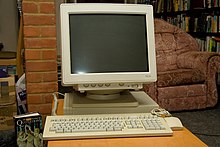Network Computing Devices
This article needs additional citations for verification. (April 2008) |
 | |
| Industry | Computers |
|---|---|
| Founded | 1987 in Mountain View, California, United States |
| Founders |
|
| Defunct | 2004 |
| Headquarters | , United States |
| Products | Thin clients |

Network Computing Devices (NCD) was a company founded in 1987 to produce a new class of products now known as a thin client. It was founded in Mountain View, CA, and when it closed it was headquartered in Beaverton, Oregon.
The corporate founders were Mike Harrigan, Doug Klein, Dave Cornelius, Ed Basart, Martin Eberhard, and Kevin Martin.
At that time these devices were known as or X Terminals. Judith Estrin and William Carrico joined the company about 6 months after its founding as its new CEO and executive vice president, and led the company through its IPO in 1992. The products were some of the earliest examples of a thin client and providing remote access to data in something other than ASCII as was common with traditional terminals of the time.
The X Protocol provided a way to show high-resolution images of data and graphics over a network connection. NCD supported a range of network protocols including TCP/IP, Token Ring, DECnet and others.
Acquisitions[]
NCD purchased , which made an X Window System for Microsoft Windows.[1]
NCD purchased in 1994. Z-Code made , a cross platform open standards email client. Z-Mail was later sold by NCD to Netmanage.
NCD purchased X-terminals line from Tektronix.[2]
NCD ceased operations in 2004. However, a few of the company's employees have set up a new company, ,[3] to provide former NCD customers and others with service, support and products.
See also[]
- DESQview/X, a similar product
References[]
- ^ Joanie M. Wexler (May 10, 1993). "NCD beefs up X software for Windows". Computerworld. p. 59. Retrieved February 21, 2017.
- ^ John Cox (November 23, 1998). "NCD's thin clients get a multimedia boost in buyout". Network World. p. 12. Retrieved February 21, 2017.
- ^ "ThinPATH Systems Inc". March 1, 2020.
External links[]
- Welcome to NCD – The Thin Client Experts!
- NCD X-Terminal HOWTO
- National Semiconductor & NCD to Jointly Develop Information Appliances Business Wire, Nov 14, 2000
- Network Computing Devices – NCD – Acknowledged by Australian Government Technology Productivity Award Business Wire, March 28, 2001
- Network Computing Devices, Inc. Introduces NCD ThinPATH PC; New Software Manages PCs as Thin Clients, Reducing the Total Cost of Ownership of the Desktop Business Wire, March 27, 2002
- NCD is Finalist in The Computing Industry Awards 2002; Newly Launched ThinPATH PC is Selected as a Finalist in the Computing Industry Awards Business Wire, August 13, 2002
- 1987 establishments in California
- 2004 disestablishments in Oregon
- American companies established in 1987
- American companies disestablished in 2004
- Companies based in Mountain View, California
- Companies based in Portland, Oregon
- Computer companies established in 1987
- Computer companies disestablished in 2004
- Defunct companies based in Oregon
- Defunct companies based in the San Francisco Bay Area
- Defunct computer companies of the United States
- Defunct computer hardware companies
- Technology companies based in the San Francisco Bay Area
- Technology companies established in 1987
- Technology companies disestablished in 2004
- Thin clients
- X Window System